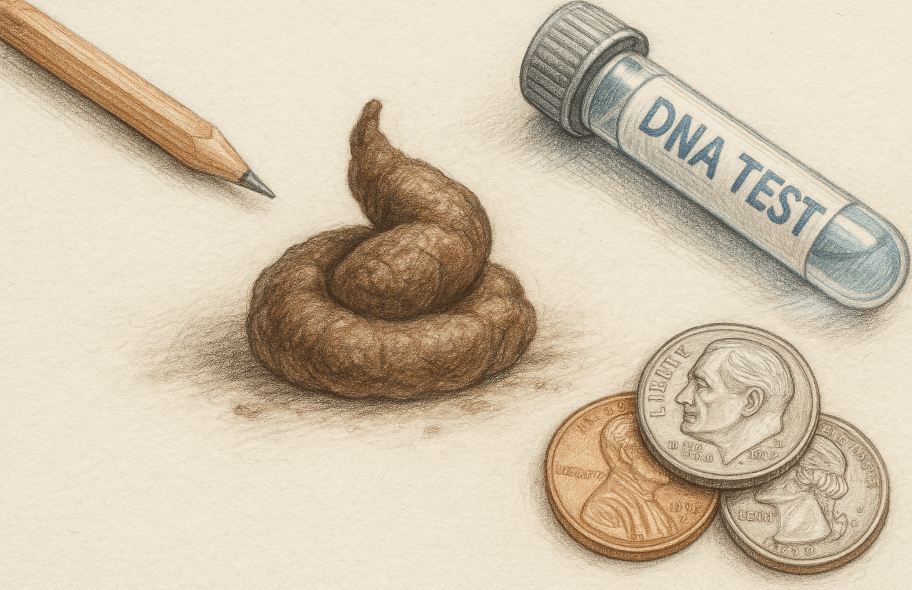Dog Poop DNA Testing Cost: What You Need to Know
Dog poop DNA testing has become a popular solution in many communities to address issues related to irresponsible pet ownership, such as uncollected waste in public spaces. This innovative technology uses DNA analysis to identify the source of dog feces, holding owners accountable for their pets’ actions. While the benefits are clear—cleaner neighborhoods and improved community health—the cost of dog poop DNA testing is a common concern for pet owners and property managers alike. In this blog post, we’ll explore the factors that influence the cost, its practical applications, and whether it’s worth the investment.
Expert Insight on DNA Testing for Dogs
“Finding out your dog’s breed isn’t just a fun activity for curious pet parents. There are many benefits of DNA testing for dogs, ranging from identifying genetic health risks to discovering physical traits that may affect how your four-legged friend looks.”
— PetMD
Factors Affecting Dog Poop DNA Testing Cost
The cost of dog poop DNA testing can vary significantly based on several factors. Understanding these variables will help you better anticipate expenses and make informed decisions.
Initial Registration Fees:
Most programs require an upfront fee to register your dog’s DNA profile in a database. This typically ranges from $25 to $50 per dog.Testing Kit Costs:
The price of the DNA testing kit itself may vary depending on the provider and the complexity of the analysis. Kits usually cost between $50 and $100.Ongoing Maintenance Fees:
Some services charge annual or monthly fees to maintain your dog’s profile in the database, which can range from $10 to $30 annually.Community Program Participation:
If you live in a managed community or apartment complex, the cost may be shared among residents, reducing individual expenses.Penalties for Non-Compliance:
Failing to clean up after your dog could result in fines, which often exceed the initial testing costs, making compliance financially advantageous.
Understanding these factors ensures you’re prepared for both the upfront and long-term costs associated with dog poop DNA testing.

Benefits of Dog Poop DNA Testing
While the cost of dog poop DNA testing might seem high, the benefits it offers can outweigh the expense for many communities and pet owners. Here are some key advantages.
Improved Community Hygiene:
By identifying offenders, communities can ensure that all pet owners take responsibility for cleaning up after their dogs, leading to cleaner public spaces.Reduced Health Risks:
Uncollected dog waste can harbor harmful bacteria and parasites, posing health risks to humans and animals. DNA testing helps mitigate these dangers.Increased Accountability:
Knowing that their dog’s waste can be traced encourages owners to act responsibly, fostering a culture of accountability.Enhanced Property Value:
Cleaner neighborhoods and well-maintained communal areas can boost property values, benefiting homeowners and landlords.Conflict Resolution:
DNA testing eliminates disputes over whose dog left the mess, promoting harmony among neighbors.
These benefits highlight how dog poop DNA testing contributes to healthier, happier, and more harmonious communities.
Check this guide 👉Pregnant Dog Pooping a Lot: Best 7 Expert Tips!
Check this guide 👉Dog Pooping Clear Liquid: Best 7 Expert Tips!
Check this guide 👉Dog Pooping Black Liquid: Best 7 Health Tips!
Cost Components of Dog Poop DNA Testing | Potential Savings and Benefits |
|---|---|
Initial registration fees ($25–$50) | Reduced cleanup costs for communities |
DNA testing kit ($50–$100) | Lower risk of disease outbreaks |
Annual maintenance fees ($10–$30) | Improved property aesthetics and value |
Penalties for non-compliance | Stronger enforcement of pet policies |
Shared costs in community programs | Enhanced neighborly relationships |
How Dog Poop DNA Testing Works
Understanding the process behind dog poop DNA testing can demystify the service and clarify why it comes at a cost. Here’s a step-by-step breakdown of how it works.
Sample Collection:
A cheek swab is taken from your dog to collect its unique DNA profile, which is then stored in a secure database.Database Matching:
When uncollected dog waste is found, a sample is collected and analyzed to match it with a registered dog’s DNA profile.Owner Notification:
Once a match is confirmed, the dog’s owner is notified and held accountable for cleaning up the waste.Fines or Warnings:
Depending on the community’s rules, owners may receive warnings or fines for failing to comply with cleanup responsibilities.Continuous Monitoring:
The system remains active, ensuring ongoing accountability and deterring repeat offenders.
This straightforward process highlights the efficiency and effectiveness of dog poop DNA testing in addressing persistent issues.
Challenges and Considerations of Dog Poop DNA Testing
While dog poop DNA testing offers numerous benefits, there are also challenges and considerations to keep in mind before implementing or participating in such programs.
High Initial Costs:
The upfront investment for registration and testing kits can be prohibitive for some individuals or communities.Privacy Concerns:
Some pet owners worry about how their dog’s DNA data is stored and whether it could be misused in the future.Limited Scope:
The program only works if all dogs in the community are registered, which can be difficult to enforce universally.Resistance from Owners:
Some pet owners may resist participation due to perceived inconvenience or skepticism about the program’s effectiveness.Administrative Burden:
Managing the program, collecting samples, and enforcing penalties can create additional work for community managers or local authorities.
Despite these challenges, careful planning and communication can help overcome obstacles and ensure the program’s success.
Ways to Reduce Dog Poop DNA Testing Costs
If you’re concerned about the cost of dog poop DNA testing, there are strategies to reduce expenses without compromising the program’s effectiveness.
Group Discounts:
Negotiate bulk pricing with providers if multiple dogs in your community need testing.Subsidized Programs:
Some communities or HOAs subsidize part of the cost, making it more affordable for residents.Volunteer Coordination:
Recruit volunteers to assist with sample collection and administrative tasks, lowering operational expenses.Phased Implementation:
Roll out the program gradually to spread costs over time, rather than funding everything upfront.Awareness Campaigns:
Educate residents about the benefits of testing to increase participation and reduce resistance, ensuring broader coverage.
By implementing these strategies, communities can make dog poop DNA testing more accessible and sustainable.
Alternatives to Dog Poop DNA Testing
If DNA testing isn’t feasible for your community, there are alternative approaches to encourage responsible pet ownership.
Designated Waste Stations:
Install convenient pet waste stations with bags and bins to make cleanup easier for owners.Incentive Programs:
Reward responsible pet owners with discounts or recognition to encourage compliance.Regular Inspections:
Hire staff or volunteers to monitor public spaces and issue warnings or fines for violations.Community Education:
Host workshops or campaigns to raise awareness about the importance of cleaning up after pets.Surveillance Cameras:
Use cameras in problem areas to deter offenders and identify violators without DNA testing.
These alternatives provide effective ways to address pet waste issues without relying solely on DNA testing.
Tips for Implementing a Successful Dog Poop DNA Testing Program
Successfully launching a dog poop DNA testing program requires careful planning and execution. Follow these tips to ensure smooth implementation.
Engage Stakeholders Early:
Involve residents, property managers, and local authorities in discussions to build support and address concerns.Choose a Reputable Provider:
Select a trusted DNA testing company with a proven track record and transparent pricing.Set Clear Rules:
Establish guidelines for participation, penalties, and enforcement to avoid confusion or disputes.Communicate Benefits Clearly:
Highlight how the program improves community cleanliness and safety to gain buy-in from participants.Monitor Progress Regularly:
Track results and gather feedback to refine the program and address any emerging issues promptly.
By following these steps, you can create a program that is both effective and well-received by your community.
Frequently Asked Questions About Dog Poop DNA Testing Cost
How much does dog poop DNA testing cost?
Costs typically range from $25 to $100 for initial registration and testing, with potential ongoing fees of $10–$30 annually.
Is dog poop DNA testing mandatory?
It depends on the community or property management. Some places require participation, while others offer it as an optional service.
What happens if my dog’s waste is identified?
You’ll likely receive a warning or fine, depending on the rules of your community or program.
Can I opt out of dog poop DNA testing?
Opt-out options vary by location, but non-participation may result in higher penalties if waste is left uncollected.
Is my dog’s DNA data safe?
Reputable providers use secure databases, but it’s important to review privacy policies before registering.
Is Dog Poop DNA Testing Worth the Cost?
Dog poop DNA testing represents a modern solution to an age-old problem: irresponsible pet ownership. While the cost may initially seem high, the long-term benefits—cleaner communities, reduced health risks, and increased accountability—make it a worthwhile investment for many. For pet owners, participation not only demonstrates responsibility but also contributes to a more pleasant living environment. For communities, it fosters harmony and pride. Whether you’re considering implementing a program or simply weighing the pros and cons, understanding the costs and benefits ensures you make an informed decision that benefits everyone involved.
Natural Antioxidants for Cats: Best 7 Expert Tips! – Discover how antioxidants boost your cat’s health, support longevity, and protect against oxidative stress naturally.
Can Dogs Be Lactose Intolerant? Best 7 Expert Tips! – Discover symptoms, safe alternatives, and how to manage lactose intolerance in dogs effectively.
Natural Antioxidants for Dogs: Best 7 Expert Tips! – Discover how antioxidants boost immunity, fight aging, and keep your dog healthy naturally.
Long-Term Effects of a Cat Eating Chocolate: Best 7 Tips! – Learn the risks, symptoms, and how to protect your cat from lasting health issues.




